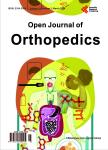Repurposing Denosumab to Stabilize Acetabular Protrusio: Obviating Surgery
Repurposing Denosumab to Stabilize Acetabular Protrusio: Obviating Surgery作者机构:Chief of Surgery and Director Professional Services P. D. Hinduja Hospital and Medical Research Centre Mumbai India Department of Orthopedics P. D. Hinduja Hospital and Medical Research Centre Mumbai India
出 版 物:《Open Journal of Orthopedics》 (矫形学期刊(英文))
年 卷 期:2020年第10卷第5期
页 面:110-115页
学科分类:1002[医学-临床医学] 100210[医学-外科学(含:普外、骨外、泌尿外、胸心外、神外、整形、烧伤、野战外)] 10[医学]
主 题:Denosumab Re-Purpose Prosthetic Migration Osteolysis
摘 要:Intrapelvic prosthetic migration prosthesis following hip arthroplasty can occur due to aseptic loosening, infection, injury and malposition of the cup with chronic instability. Revision surgery is the treatment option, but is often complex, is high risk owing to the co-morbidities of the patient, has higher complications and sometimes even patients refuse for the surgery. Osteoclast mediated bone resorption at the prosthetic bone interface is the main pathophysiology process involved in aseptic loosening associated intrapelvic migration. RANK/RANKL (Receptor Activated Nuclear factor κB Ligand) is the primary pathway responsible for the periprosthetic osteolysis, therefore, we have offered Denosumab which binds to RANKL and inhibits osteoclasts mediated bone resorption, to our two patients with intrapelvic prosthetic migration who have refused for the revision surgery. Here, we report the outcome of these two cases of Intrapelvic prosthetic migration following a hip arthroplasty that was treated using subcutaneous injection of 120 mg denosumab monthly for 3 months. Both the cases had good functional outcomes and radiographs showed good consolidation of bone around the prosthesis. These cases suggest denosumab can be repurposed to arrest further intrapelvic prosthetic migration due to its anti-resorptive and bone forming action and can avoid the need for a complex revision surgery.



